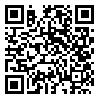Volume 22, Issue 86 (5-2023)
QJCR 2023, 22(86): 142-175 |
Back to browse issues page
Download citation:
BibTeX | RIS | EndNote | Medlars | ProCite | Reference Manager | RefWorks
Send citation to:



BibTeX | RIS | EndNote | Medlars | ProCite | Reference Manager | RefWorks
Send citation to:
pasha S, Hosseinian S, Pordelan N. The Native Model of Challenges of Transitioning Students from University to Work: A Grounded Theory Research. QJCR 2023; 22 (86) :142-175
URL: http://irancounseling.ir/journal/article-1-1839-en.html
URL: http://irancounseling.ir/journal/article-1-1839-en.html
(Corresponding Author),PhD Counseling, Full Professor, Department of counseling, faculty of education and psychology, Alzahra university, Tehran, Iran. Hosseinian@Alzahra.ac.ir
Abstract: (5774 Views)
Aim: The transition from university to work is one of the most sensitive periods in the lives of the educated, which can be a challenging or a relatively calm developmental stage. Therefore, the quality the type of this transition can affect the future career path as well as other life transitions. The purpose of the current research is to identify the challenges of the transition of students from university to work in the form of developing a native theoretical model. Methods: This research was conducted qualitatively using the grounded theory in 1401 .Semi-structured interviews were conducted with 16 undergraduate and graduates of the University of Isfahan using the method of purposive sampling, considering the rule of saturation. Findings: The results indicated the identification of 52 concepts and 15 categories. The model of the challenges of transitioning from university to work were compiled into 1. Causal conditions: Weakness in basic skills, self-awareness, psychological capitals, incompatibility of the individual characteristics with the field, low adaptability, lack of work experience; 2. Contextual conditions: Lack of environmental support, geographical location, imbalance between the supply and demand of the field in society; 3. Intervening conditions: Networking behavior; 4. Strategies: Skill training in a job unrelated to the field, education without a goal in postgraduate studies, willingness to migrate; and 5. The consequences: Individual, and social consequences. Conclusion: The results indicate that the challenges of students' transition from university to work are classified into two general categories: Challenges related to lack of preparedness (intrapersonal) and environmental factors (extra-personal). Therefore, the successful transition from university to work can be seen as dependent on two general factors: Intrapersonal (preparedness) and extra-personal (environment. ( The sum of these factors is effective in preparing students for transition .Specialists can help in preparing and the successful transition of students from university to work and in preventing unemployment and its resulting harms.
Type of Study: Research |
Subject:
Career counseling
Received: 2023/01/14 | Accepted: 2023/05/31 | Published: 2023/09/26
Received: 2023/01/14 | Accepted: 2023/05/31 | Published: 2023/09/26
Send email to the article author
| Rights and permissions | |
 |
This work is licensed under a Creative Commons Attribution-NonCommercial 4.0 International License. |






